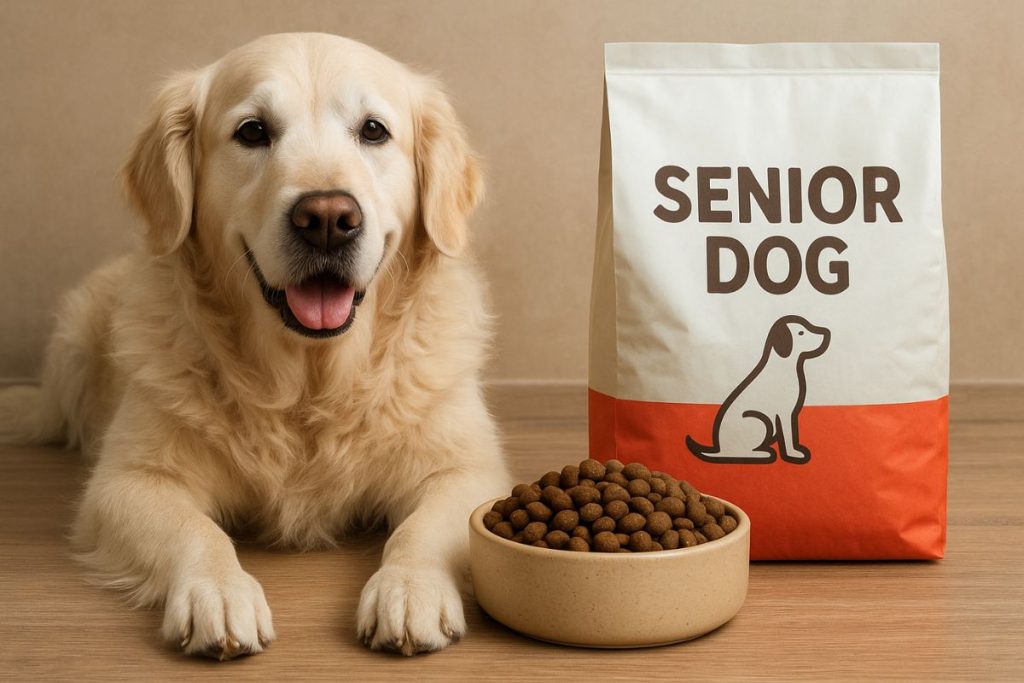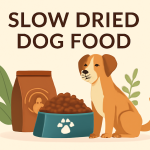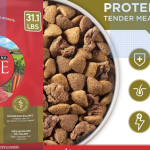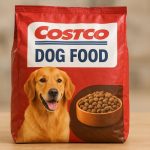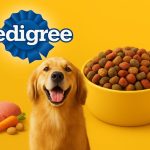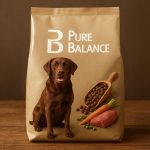Meta Title: Hills Dog Food: Best Senior Dog Nutrition Guide
Meta Description: Hills dog food for senior dogs offers balanced, gentle nutrition. Discover top tips for choosing the best diet to support your aging dog’s health.
Hills Dog Food: Gentle Nutrition for Senior Dogs
Every dog ages differently, but by middle age (typically around 7–8 years) you’ll notice some changes. Gray fur around the muzzle, slower movement, or less interest in playtime can signal that your dog is entering the senior stage. At this point, diet becomes even more important than before. Senior dogs often have decreased metabolism, so feeding them the same ration as in their youth can lead to unwanted weight gain or strain on internal organs. On the other hand, age-related muscle loss means they still need plenty of high-quality nutrition. A gentle diet helps bridge this gap.
Senior dogs deserve a tailored approach to nutrition. As they age, many develop sensitive digestive systems, slower metabolisms, and health issues like arthritis or kidney disease. In general, older dogs benefit from easy-to-digest ingredients, controlled calories, and joint-supporting nutrients. This article explores how to choose the best dog food for senior dogs, highlighting Hills dog food and other top brands, and emphasizing gentle nutrition for aging pets. We’ll compare age-appropriate formulas like Royal Canin dog food, hypoallergenic dog food, salmon dog food, and Wellness dog food, and share expert tips on feeding schedules and more. Whether your pet is “senior” at 7 or still spry at 10, the goal is the same: keep your best friend healthy, comfortable, and happy in their golden years.
Understanding Senior Dog Nutritional Needs
As dogs grow older (often around 7–8+ years, depending on size and breed), their bodies change significantly. They may gain weight if their activity level drops, or lose muscle if protein isn’t adequate. They often develop age-related conditions like arthritis, dental disease, or kidney issues. All of these factors affect diet. Key points to know about senior dog nutrition include:
- Muscle maintenance: Senior dogs need plenty of high-quality protein. Studies and veterinarians agree older dogs may require more protein (not less) than younger adults to prevent muscle lossakc.org. Without enough protein, seniors can lose lean body mass, which hurts mobility and general health.
- Calorie control: Aging dogs usually slow down. Cornell University experts advise monitoring weight closely; if your dog’s activity declines and it gains weight, they recommend to “decrease portions or switch to a lower-calorie food”vet.cornell.edu. Excess weight strains joints and organs. Conversely, if a senior starts losing weight or muscle, upping quality protein or calories may be needed. Maintaining a steady, healthy weight is crucial.
- Digestive comfort: Many older dogs have sensitive stomachs or slower digestion. A gentle diet uses highly digestible ingredients (like cooked meats, well-processed grains, and fiber) to ease nutrient absorption. Fiber from sources like pumpkin or beet pulp supports digestion. Lower fat content is often included to avoid pancreatitis risk and lessen digestive load. Probiotics or prebiotics can also be beneficial.
- Joint and cognitive support: Nutrients like glucosamine, chondroitin, and omega-3 fatty acids (EPA and DHA) can help arthritis and brain health in seniors. For example, fish oils (from salmon, for example) provide anti-inflammatory omega-3s that support joints, skin, heart, kidneys and even brain functionpetmd.com. Many senior foods add glucosamine for hip and joint comfort, and antioxidants (vitamins E, C, beta-carotene) for immune support.
- Hydration and dental health: Older dogs may drink less or have missing teeth. Wet dog food or broth-moistened kibble increases water intake and softens food. Offering smaller or softened kibble can also help seniors chew comfortablyakc.org. Many senior formulas come in special shapes or softer textures to ease chewing strainakc.org. Keeping your dog well-hydrated is critical for kidney health and digestion.
Veterinary advice highlights that senior feeding goals are twofold: to prevent or manage disease, and to increase the dog’s longevitypetmd.com. In practice, that means choosing a diet that maintains healthy weight, supports joints and organs, and keeps the coat and skin in good condition. Monitor your dog’s body condition often, and adjust the diet as needed (consulting your vet when in doubt).
Cornell canine specialists emphasize practical checks: if your senior dog starts packing on pounds, cut portions or switch to a lighter formulavet.cornell.edu. If it’s losing weight or muscle, focus on higher-quality protein. These simple adjustments – along with the right choice of food – help meet an older dog’s needs for both disease prevention and vitalitypetmd.com.
Key Nutrients & Features in Gentle Senior Dog Foods
Choosing a gentle senior diet means looking for specific nutritional features. Below are the most important elements to consider:
- High-Quality Protein: Look for named meat sources (e.g., chicken, turkey, salmon) first on the ingredients list. Animal proteins supply essential amino acids to preserve muscle. As the AKC notes, senior diets should not restrict protein – in fact, older dogs often need about 50% more protein than younger dogs to maintain muscle massakc.org. In practice, senior kibble formulas typically contain around 18–23% protein (dry), but the source and digestibility are what matter mostpetmd.com.
- Moderate Fat Content: While active dogs need high energy, many seniors are less active. A moderate fat level (often 5–15% of dry matter) provides energy without excess calories. Healthy fats are essential for skin and coat. Crucially, fish-based fats (omega-3s) fight inflammation. PetMD highlights that fish oil’s anti-inflammatory omega-3s support skin, joints, heart, kidneys, and brain health in dogspetmd.com. So, salmon or fish oil in the ingredients is a plus. Salmon-based foods can ease arthritis stiffness and even boost cognitive health.
- Digestibility and Gentle Carbs: Easily digestible ingredients (like brown rice, oatmeal, sweet potatoes, or well-processed grains) help an aging gut absorb nutrients better. Some healthy senior diets use gentle grains or grain-free formulas if dogs have grain sensitivities. Fiber sources like pumpkin, beet pulp or chicory root (prebiotic) support stool quality and satiety. Moderate fiber helps weight control and prevents constipation, which seniors can experience.
- Joint-Support Nutrients: Look for added glucosamine and chondroitin (for cartilage health). Ingredients like green-lipped mussel or fish oil also provide omega-3s for joints. For example, Cornell experts note that prescription diets like Royal Canin Mobility are formulated for arthritis reliefvet.cornell.edu. Many over-the-counter senior foods mimic these by including joint supplements. Always check labels: a senior food should explicitly list these joint-support compounds if arthritis is a concern.
- Antioxidants & Vitamins: A mature immune system can use a boost. Senior foods often include extra antioxidants (vitamin E, C, beta-carotene, selenium) to protect cells. Balanced levels of calcium, phosphorus, and B-vitamins are also important for organ support. For instance, Hill’s senior formulas emphasize “balanced minerals for heart and kidney health” to suit an older dog’s changing physiologyhillspet.com. This means ingredients like precise levels of calcium and sodium to ease strain on the heart and kidneys.
- Controlled Sodium & Phosphorus: If your dog has heart or kidney issues, look for formulas with moderate sodium and reduced phosphorus. Many prescription senior diets lower these minerals. Even for healthy seniors, avoiding excess salt is wise. Check the label if your dog has specific conditions.
- Palatability: Older dogs may lose some sense of smell or appetite. A strong aroma and taste are important. Some senior diets add natural flavor enhancers or warm spices. Warming food can also increase aroma (AKC notes that heating wet food can stimulate appetite in picky seniors)akc.org. Consider foods with visible vegetables/meats or mixed textures (kibble + chunks). Always offer fresh food to entice eating.
List: Key features of a good senior dog diet
- High-quality, easily digestible protein (named meats or fish)
- Controlled calories to maintain healthy weight (prevent obesity)
- Healthy fats, especially omega-3s (from fish) for coat and inflammation
- Fiber (e.g., pumpkin, beet pulp) for gentle digestion and fullness
- Joint-support additives (glucosamine, chondroitin)
- Antioxidants, vitamins, and balanced minerals for organ support
- Hydration and palatability (wet food options, good aroma)
By focusing on these nutrients, you ensure gentle nutrition that addresses a senior dog’s specific needs. Remember, every dog is an individual – discuss any special diet with your vet, especially if your dog has health issues. A nutrition plan tailored to your dog can make a big difference in comfort and longevity.
Gentle Nutrition from Top Brands
Many reputable brands offer senior dog foods formulated for gentle nutrition. Below we highlight leading options, focusing on the specified brands and categories, and noting specialty diets like salmon-rich and hypoallergenic formulas.
Hills Dog Food for Senior Dogs
Hill’s Pet Nutrition is known for its science-backed diets. Hill’s Science Diet Adult 7+ (for medium/large dogs) and Science Diet Adult 11+ (for small breeds) are popular senior lines. According to Hill’s, their senior foods are “made with special care for an older pet’s changing biology”hillspet.com. Key features of Hill’s senior formulas include:
- Balanced minerals to support heart and kidney health (important for seniors)hillspet.com.
- Omega-6 fatty acids & Vitamin E for skin and coat vitality, which can decline with agehillspet.com.
- Easy-to-digest ingredients (Hill’s emphasizes digestibility to support older digestive systems)hillspet.com.
- Brain support: Hill’s even offers “biology-based” senior diets aimed at sustaining brain function and energy in less-active dogshillspet.com.
Hill’s Prescription Diets add another layer of senior care. For instance, Hill’s Prescription Diet j/d (Joint Diet) is formulated for dogs with arthritis, including extra omega-3s and joint nutrients for comfort. (Image of calm senior Labrador eating gentle food.) Figure: A senior Labrador Retriever enjoying a gentle, nutritious meal (photo).
Another specialized formula is Hill’s Prescription Diet w/d (Weight/Diabetes), designed for senior dogs that need to lose weight or manage blood sugar. It provides high fiber and added L-carnitine to support metabolism and maintain lean muscle mass. Hill’s k/d (kidney diet) and c/d (bladder support) are other examples of prescription diets that can be used if your senior has specific medical issues. In practice, Hills dog food lines come in both dry and wet forms: their senior dry kibbles are nutritious and crunchy, and their senior wet foods offer softer textures (good for dogs with dental issues)hillspet.com. Overall, Hill’s emphasizes high-quality, balanced ingredients, making Hills dog food a vet-recommended choice for many older pets.
Royal Canin Dog Food
Royal Canin designs highly tailored diets. Their Senior Dog Food line (e.g. Size Health Nutrition 8+ and 12+ formulas) provides age-specific nutrition. Royal Canin’s senior foods often feature:
- Specialized kibble shapes: Many Royal Canin senior formulas use smaller or unique kibble that can be softened with water, making it easier for older dogs to chewpetco.com. This is ideal if your dog has dental issues.
- Healthy fats (EPA & DHA): Royal Canin emphasizes nutrients like fish oil omega-3s (EPA, DHA) and antioxidants for skin, coat, joint and digestive healthpetco.com. This supports mobility and fur quality in seniors.
- Tailored nutrition by size/breed: They offer different recipes for small, medium, and large breed seniors. For example, their Large Aging 8+ diet balances phosphorus and glucosamine for larger joints, while their Small Aging 12+ kibbles are mini-sized for tiny jaws.
- Precision nutrition: Royal Canin is vet-formulated, often recommended by veterinarians. Cornell University vets note that Royal Canin’s Mobility formula specifically targets arthritic dogs with green-lipped mussel and high omega-3 contentvet.cornell.edu.
Choosing Royal Canin dog food gives many owners confidence in precise nutrition. For healthy senior maintenance, Royal Canin’s Overweight or Renal lines (if prescribed by a vet) can also be considered. A Petco summary highlights that Royal Canin Senior diets focus on “healthy skin, coat, and stool quality via nutrients such as EPA, DHA, and antioxidants”petco.com, reflecting their comprehensive approach.
Hypoallergenic Dog Food
Some senior dogs suffer from food sensitivities or allergies (common allergens include chicken, beef, dairy, or wheat). For such dogs, hypoallergenic dog food or limited-ingredient diets can be valuable. These special diets often feature just one novel meat (rabbit, venison, duck, or hydrolyzed chicken) and a few simple carbohydrates to eliminate allergens. If a senior dog has chronic skin itchiness, ear infections, or diarrhea, a vet may recommend an 8–12 week elimination trial of a hypoallergenic formula. During this trial, a single-protein diet reveals if symptoms improve.
Prescription options include Hill’s z/d or Royal Canin Hydrolyzed (where proteins are broken into tiny pieces so the immune system can’t recognize them). There are also limited-ingredient commercial diets: for example, salmon & potato or lamb & rice recipes from brands like Wellness, Blue Buffalo, or Nulo. These can relieve itchy skin and digestive upset if food allergy is the culprit. Always consult your vet before starting a hypoallergenic diet, as true food allergies require veterinary guidance.
Salmon Dog Food
Salmon-based dog foods are often gentle on digestion and rich in nutrients. Salmon is a high-quality, lean protein that’s easily digested, plus it supplies ample omega-3 fatty acids (EPA/DHA). In a senior diet, these omega-3s provide anti-inflammatory benefits that can help stiff joints, dry skin, and even cognitive decline. As mentioned, PetMD notes fish oil’s many benefits for senior dogs’ skin, joints, heart, kidneys, and brainpetmd.com.
Examples of salmon dog foods include Wellness CORE Senior (Turkey & Salmon Recipe) and Blue Buffalo Life Protection (Salmon & Brown Rice Senior). If your dog likes fish, these are gentle choices. Even if not on a full salmon diet, you can supplement a senior meal with a spoon of salmon oil or chopped cooked salmon to boost omega-3s. The pink color of salmon also often appeals to dogs. Just ensure the fish dog food is balanced for all nutrients and not too high in fat, and beware of bones and mercury (commercial foods handle that). Overall, incorporating salmon into the diet can aid coat health and joint comfort in aging dogs.
Wellness Dog Food
The Wellness brand emphasizes natural ingredients and holistic nutrition. Their senior formulas (like Wellness Complete Health Grains Senior or Wellness CORE Senior) include high-quality proteins, whole grains or healthy carbohydrates, and added nutrients for aging dogs. For example, Wellness Senior Chicken & Barley Recipe contains glucosamine and chondroitin for joints, plus omega-3/6 fatty acids for coat health. Wellness CORE Senior (Turkey, Chicken & Salmon) is grain-free and protein-rich, designed to support mobility and healthy weight.
Wellness foods avoid artificial preservatives or colors, which some owners prefer for gentle diets. They include fruits and vegetables for vitamins and antioxidants. Many Wellness senior recipes include probiotics and fiber for digestion. While not the only option, Wellness dog food (both the Complete Health and CORE lines) is often recommended by pet owners who want natural, balanced nutrition with novel proteins. When trying Wellness or any brand, review the ingredient list: the first ingredients should be good meat sources, and avoid excessive fillers or by-products.
Tips for Choosing & Feeding Senior Dog Food
To ensure your senior dog thrives on a gentle diet, consider the following guidelines and checklist:
- Transition Gradually: When switching to a new senior formula, mix it in slowly over about a week. Start with 25% new food and 75% old, then gradually increase to minimize stomach upset.
- Check AAFCO Approval: Make sure the food is labeled “complete and balanced” for adult maintenance or all life stages. This indicates it meets basic nutrient profiles (AAFCO standards)petmd.com. (Note: AAFCO compliance means the diet provides essential nutrients, but it doesn’t guarantee specialty benefits.)
- Monitor Weight: Senior dogs often need fewer calories. Weigh your dog regularly and observe body condition. If weight creeps up, reduce portion sizes or switch to a “light” or weight-control formula. Cornell vets recommend portion adjustment or lower-calorie diets if activity declinesvet.cornell.edu. Likewise, if your dog is underweight or losing muscle, increase protein or meals.
- Divide Meals: Feeding two or three smaller meals per day (instead of one large) can improve digestion and stabilize energy. Many seniors do better with more frequent, smaller portions, especially if they have diabetes or digestive issues.
- Hydration is Critical: Always provide fresh water. Some seniors drink less, so offering wet food or adding warm water/broth to kibble can help ensure proper hydration.
- Use Simple Add-Ins: To boost appeal and nutrition, you can add safe extras: plain canned pumpkin (fiber), low-sodium broth (flavor), or a spoon of salmon oil (fatty acids). Just account for these in daily calorie totals. Also, consider vegetables like green beans or carrots as low-calorie treats.
- Dental Care Matters: Brush your senior’s teeth regularly and offer dental chews if recommended. Good dental hygiene ensures they can eat comfortably. If chewing is a problem, soft foods or pulverized kibble may be needed.
- Regular Vet Checkups: Senior dogs should see the vet at least biannually. Use these visits to adjust diet as needed. What was suitable at age 8 may need tweaking at 10 or 12.
Senior Dog Feeding Checklist:
- ✅ AAFCO-approved formula: Senior or adult maintenance (complete & balanced)petmd.com.
- ✅ Senior-specific formula: Or high-quality adult food if very active.
- ✅ Age-appropriate protein: Good sources (chicken, turkey, salmon, lamb).
- ✅ Rotate proteins: Alternate between chicken, fish, beef, etc., to provide variety and cover different nutrients.
- ✅ Joint supplements: Glucosamine, fish oil, etc., if vet-recommended (many senior diets include them).
- ✅ Weight and condition: Keep dog lean; adjust feeding to avoid obesity.
- ✅ Dental care: Tooth brushing or dental chews to maintain good oral health.
- ✅ Hydration: Always have water available; consider wet food or broth.
By tailoring meals and routine this way, you help your senior dog digest food easily and maintain good health.
Smart Treats and Supplements
Treats should be given in moderation. Older dogs tend to gain weight easily, so limit high-calorie biscuits. Instead, try nutritious treats such as small pieces of cooked vegetables (carrot, green bean) or lean meat. There are also special senior treats enriched with joint-support nutrients. If you use treats, subtract those calories from the daily diet.
As for supplements, many vets recommend adding joint support (glucosamine, chondroitin, MSM) or fish oil to a senior dog’s diet if the food doesn’t already contain enough. Probiotics and digestive enzymes can help older dogs with gut health. Always consult your vet before starting any supplement, and choose reputable brands.
Building a Senior Dog Meal Plan
Crafting a meal plan for an aging dog involves a few clear steps:
- Assess your dog’s health: Start by consulting your veterinarian for a senior wellness exam. Note your dog’s breed, ideal body weight, and any health issues (like arthritis, kidney problems, or diabetes). This information will guide your diet choice.
- Choose the right formula: Select a high-quality senior dog food that matches your dog’s needs. For example, if your dog needs weight control, look for a light/senior formula. If digestive or allergy issues are a concern, consider a hypoallergenic or limited-ingredient diet. Always check the label for a complete balance of nutrients (and AAFCO approvalpetmd.com).
- Transition slowly: Mix the new senior food into your dog’s current food gradually over 7–10 days. Start with about 25% new food and 75% old food, then increase the new food each day. This gradual switch helps avoid digestive upset.
- Monitor intake and weight: Use the feeding guidelines on the food label as a starting point, then adjust portions based on your dog’s condition. Weigh your dog or use body condition scoring regularly. If your dog starts gaining weight, reduce portions or switch to a lighter senior diet; if they lose weight, ensure they’re eating enough or consult your vetvet.cornell.edu.
- Add healthy meal enhancements: You can mix in safe, nutritious add-ons like plain cooked pumpkin (good fiber), low-sodium chicken or bone broth, or lean cooked meats. These can entice picky eaters and add moisture to kibble. Omega-3-rich oils (from salmon or fish oil) can be stirred into food to support coat and joints.
- Provide fresh water always: Senior dogs may drink less, so ensure water is always available. Adding water or broth to dry kibble or offering wet food can help keep them hydrated.
- Regular check-ups: Senior dogs should see the vet at least twice a year. Use these visits to reassess diet and nutrition. The optimal diet for a 7-year-old may need adjustment by age 10 or 12.
Common Myths About Senior Dog Nutrition
- Myth: Senior dogs should eat less protein than younger dogs. Fact: Older dogs need more protein (not less) to maintain muscle mass. Restricting protein can accelerate muscle lossakc.org.
- Myth: All senior dog foods are the same. Fact: Senior formulas vary widely: some focus on weight management, some on joint health, some on allergies. Always match the diet to your dog’s specific needs.
- Myth: Grain-free automatically means hypoallergenic. Fact: Grain-free only removes grains; a dog can still be allergic to other ingredients (like chicken). True hypoallergenic diets use limited, novel proteins or hydrolyzed proteins to avoid allergens.
- Myth: Supplements are unnecessary if the food is “complete.” Fact: Even with a balanced diet, seniors often benefit from added supplements like fish oil or glucosamine for extra skin, coat, and joint support.
- Myth: If my senior dog looks healthy, diet can stay the same. Fact: Aging organs and metabolism change even in healthy dogs. A senior-tailored diet can help maintain vitality longer and prevent slow-onset issues.
Separating myth from fact helps avoid misconceptions and ensures your senior dog gets the right nutrition strategy.
FAQs
Q: When should I switch my dog to senior food?
A: Generally, dogs are considered seniors around 7–8 years old, but the best timing varies by breed and health. Large breeds may show senior signs earlier, and small dogs often stay active until 9–10 years. Instead of age alone, watch for signs like weight changes, decreased mobility, or digestive issues. If your dog’s lifestyle or energy changes, consult your vet about switching to a senior formula.
Q: What is the best diet for a senior dog?
A: The best senior dog diet is one tailored to your dog’s needs. In general, it should have high-quality protein to maintain muscle, healthy fats (especially omega-3s) for joints and coat, and controlled calories to prevent weight gain. Many vets recommend age-specific formulas like Hill’s Science Diet Senior or Royal Canin Senior, but a healthy senior can often do well on a good adult maintenance diet too. Choose a food labeled for older dogs and consider any health issues (weight, arthritis, etc.). Balanced nutrition is key – complete and balanced diets marked by AAFCO certification are a reliable baselinepetmd.com.
Q: Is Hills dog food good for senior dogs?
A: Yes, Hills dog food offers several senior formulas designed for older dogs. Hill’s Science Diet Adult 7+ and 11+ recipes provide balanced nutrients for aging petshillspet.com. Their ingredients include easily digestible proteins, fiber for weight control, and added omega-3s and antioxidants for skin and joints. Many veterinarians recommend Hill’s for senior dogs due to its research-based approach. For special needs, Hill’s Prescription Diet also has senior options (like j/d, w/d) which a vet can prescribe.
Q: How can I help my senior dog’s picky appetite?
A: Try warming the food slightly to enhance aroma (microwave or stir with warm water). Offering wet food or broth over dry kibble can improve taste and texture. Topping meals with a bit of lean meat or canned pumpkin can entice eating. Ensure food is fresh and not stale. Also check dental health, as missing teeth can make eating uncomfortable. If appetite loss persists, consult your vet – sometimes appetite stimulants or supplements can help older dogs.
Q: Does grain-free or hypoallergenic food benefit senior dogs?
A: Grain-free diets help dogs with grain sensitivities, but they are not necessary for every senior. Only use grain-free if your dog has a proven grain allergy. Hypoallergenic dog food (limited-ingredient or hydrolyzed-protein diets) can benefit seniors with chronic allergies (skin/ears) or sensitive stomachs. If your vet suspects a food allergy, a hypoallergenic senior formula can provide gentle nutrition by removing common allergens.
Q: At what age should I start senior dog food?
A: “Senior” is usually 7–8 years, but it depends on your dog’s health and breed. Large breeds often age faster than small breeds. If your dog still has high energy and maintains weight, you might continue an adult diet longer. However, switching around age 7 and monitoring condition is common. Talk to your vet about your dog’s specific situation.
Q: Can I feed my senior dog homemade food?
A: Homemade diets can work for senior dogs, but they must be complete and balanced. This often requires guidance from a veterinary nutritionist. Seniors still need lean protein, healthy fats, fiber, and controlled sodium. Don’t rely only on scraps or single-ingredient meals, as they lack nutrients. If you make homemade food, include supplements (like calcium or vitamins) as advised by your vet. Otherwise, a high-quality commercial senior formula (such as Hill’s Science Diet Senior) is the easiest way to meet all nutritional needs.
Q: How often should I feed my senior dog?
A: Most adult dogs do well on two meals per day. Some seniors benefit from 2–3 smaller meals to aid digestion and maintain energy. For example, feeding ¼–½ of the daily ration in the morning and afternoon (with a small snack if needed) can help. Splitting meals can also prevent hypoglycemia in older dogs. Always measure portions carefully and remove extra food after about 20 minutes to maintain routine.
Have you found a favorite senior dog food? Share your experiences in the comments below, and please consider sharing this guide with other pet owners on social media to help more dogs thrive.
Conclusion
Figure: A relaxed senior dog enjoying the benefits of a nutritious meal.
Gentle nutrition is key to keeping senior dogs happy and healthy. Brands like Hills dog food and Royal Canin dog food offer tailored senior formulas packed with the nutrients older dogs need. When choosing food, look for high-quality protein, omega-3 fatty acids, fiber, and joint-supporting ingredients, all in controlled calories. Options like hypoallergenic or salmon-rich foods can help dogs with food sensitivities or stiffness. Most importantly, adjust portions and monitor your dog’s weight to keep them lean and comfortable.
Every senior dog is unique, so consult your veterinarian for personalized advice. With the right diet and care, your senior dog can enjoy their golden years to the fullest. Together, we can help more aging dogs thrive with gentle nutrition!
Sources: Authoritative veterinary and nutrition references were used, including advice from Cornell University Vet and PetMD on senior dog dietsvet.cornell.edupetmd.com, AKC guidance on aging dogsakc.org, and manufacturer info from Hill’s and Royal Caninhillspet.competco.com.

